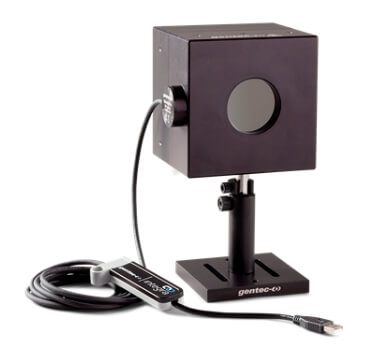Gentec-EO has followed up its recent launch of integrating sphere laser power detector series, with another model of fast laser power detectors, the IS50A-1KW-RSI.

This detector offers an impressive typical rise time of just 0.2 second – which means you get your high-accuracy measurement extremely fast compared to any other high-power detectors available on the market.
- Measure up to 1000 W of continuous power
- 50 mm aperture
- 0.01 mW noise level
- Ideal for collimated beams
- Equally suitable for beam divergence (full angle) up to 20º
Simply plug it into a computer with an INTEGRA USB or RS-232 connector, open our free proprietary software PC-Gentec-EO and you are all set to take your first measurement.
WHAT ARE THE ADVANTAGES OF USING GENTEC-EO’S INTEGRATING SPHERE TECHNOLOGY?
PERFORMANCE
First, it lets you follow the ramp-up of a high-power laser because such detectors measure laser power extremely fast as you can see on the following chart:

Integrating sphere power detectors offer many advantages performance-wise: fast response, high sensitivity, excellent spatial uniformity.
Cost-efficient Solution
The same detector can be used for measuring several laser systems because the dynamic spectral range is very wide. Indeed, these detectors have a NIST-traceable calibration for their entire calibrated spectral range, and this calibration is valid from the noise floor to the maximum power: from tens of mW to 1000 W!
This results in significant savings for customers who have many lasers to measure. Also, you do not need to purchase a display device to read your measurement since our INTEGRA technology is integrated into it. Just plug the detector into your computer.
Improved Safety
If you are particularly concerned about safety in your work environment, using an integrating sphere detector instead of a thermal detector is even safer because back-reflections are much weaker.
WORKING PRINCIPLE
An integrating sphere detector is composed of two elements. First, light enters a hollow sphere through a small aperture and it diffuses inside the sphere with multiple reflections on the sphere’s inner coating. Second, a small uniformly-lit aperture at another position in the sphere samples a portion of this diffused light and sends it onto a sensor.
Basically, integrating spheres act as attenuators to allow for the use of smaller and faster detectors.
